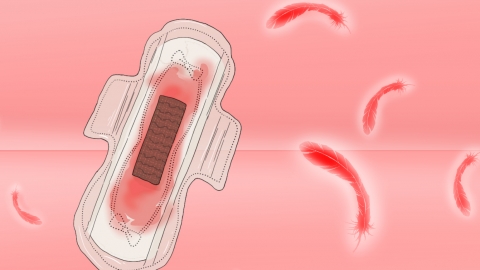What causes naturally heavy menstrual flow?
Generally, a naturally heavy menstrual flow may be caused by factors such as a larger uterine size, genetic influences, adenomyosis, uterine fibroids, or endometrial polyps. It is recommended to seek medical attention promptly, identify the underlying cause, and receive symptomatic treatment under a doctor's guidance. Specific analyses are as follows:

1. Larger uterine development: Some women are born with a relatively large uterus, resulting in a broader endometrial surface area, which naturally leads to heavier bleeding during shedding. No special treatment is required. It is important to keep the abdomen warm during menstruation, avoid strenuous exercise, and track menstrual cycles and blood loss to monitor for any abnormal changes.
2. Genetic factors: If the mother or other female family members have a history of heavy menstrual bleeding, genetic predisposition may lead to similar symptoms in female descendants. Adjusting the diet by consuming iron-rich foods such as lean meat, spinach, and animal liver can help prevent iron-deficiency anemia. Regular gynecological check-ups are also recommended.
3. Adenomyosis: This condition occurs when endometrial tissue invades the muscular layer of the uterus, causing uterine enlargement and abnormal contractions, leading to increased menstrual flow. Patients may follow medical advice to take medications such as Danazol Capsules, Gestrinone Capsules, or Dydrogesterone Tablets to relieve symptoms and reduce menstrual bleeding.
4. Uterine fibroids: These are benign tumors formed by the proliferation of smooth muscle tissue in the uterus. Submucosal fibroids or those affecting uterine contractions can result in heavier menstrual bleeding. Medications such as Mifepristone Tablets, Tranexamic Acid Tablets, or Levonorgestrel-releasing intrauterine systems may be used under medical supervision. For larger fibroids, myomectomy may be performed to remove the tumor and improve bleeding.
5. Endometrial polyps: Localized overgrowth of the endometrium forms polyps, disrupting normal endometrial shedding and causing heavy menstrual bleeding. Patients may follow medical advice to use hormonal regulators such asProgesterone Soft Capsules, Dydrogesterone Tablets, or Ethinylestradiol and Cyproterone Acetate Tablets to control polyp growth. Alternatively, hysteroscopic polypectomy can be performed to remove the polyps and restore normal menstruation.
During menstruation, adequate rest should be ensured to avoid excessive fatigue. Maintain external genital hygiene and change sanitary products frequently. Avoid spicy and irritating foods; instead, increase fluid intake and nutritional support. If symptoms of anemia such as dizziness or fatigue occur, adjust the diet promptly or take iron supplements as directed by a physician.




